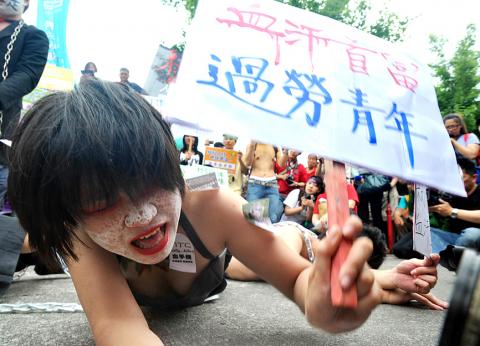Ahead of Workers’ Day yesterday, a new poll by an online job bank shed light on the poor working conditions that many Taiwanese office workers face.
In poll results released on Saturday, 77.4 percent of office workers in Taiwan said they felt like they were living a “deprived” life characterized by low income, long hours of work and a lack of sleep.
Conducted by online job bank Yes123, the poll results also show that 63.9 percent of office workers work an average of 10.4 hours a day, with 21.4 percent working more than 11 hours per day, far exceeding the maximum hours allowed by law in Taiwan.

Photo: PATRICK LIN, AFP
The law stipulates an employee should not regularly work more than eight hours a day or 84 hours per two weeks.
Almost 56 percent of office workers said they spent too much time at work, even though as much as 31.8 percent earn less than NT$22,115 per month, the minimum wage for Taiwan recommended by the International Labor Organization based on the country’s cost of living and social welfare schemes.
Yes123 deputy manager Chiu Wen-jen (邱文仁) said the poll results showed that office workers were not getting higher pay for working longer hours, but were instead living “deprived” lives.
In addition, close to 70 percent of office staff said they were not being paid for overtime. Among this group, 47.2 percent work in companies that do not give overtime pay or compensatory leave, 14 percent are entitled only to compensatory leave, and 6 percent are afraid to apply for overtime pay, even though it is offered by their companies.
Long working hours have also affected the sleep of workers. The poll showed office workers, on average, sleep only 6.2 hours per night, less than the seven to eight hours of sleep recommended for adults.
A total of 68 percent of office employees said they are not getting enough sleep, with 37.4 percent considering themselves in poor health.
As a result, some employees said they are prone to fatigue (75.8 percent), absent-mindedness (56.7 percent) and an inability to be creative (19.6 percent).
About 63 percent of office employees said they actually concentrate on work for less than seven hours a day. Based on this statistic, Chiu said companies could achieve a “win-win” situation by thinking of ways to boost employee productivity while limiting their hours of work.
Taiwan’s working hours are the fifth-longest in the world, behind South Korea, Mexico, Hong Kong and India, a 2007 report published by the Lausanne-based International Institute for Management Development showed.
The Yes123 online poll, conducted between April 11 and April 17, collected 2,140 valid samples and has a confidence level of 95 percent and a margin of error of 2.05 percentage points.

The Ministry of Education (MOE) is to launch a new program to encourage international students to stay in Taiwan and explore job opportunities here after graduation, Deputy Minister of Education Yeh Ping-cheng (葉丙成) said on Friday. The government would provide full scholarships for international students to further their studies for two years in Taiwan, so those who want to pursue a master’s degree can consider applying for the program, he said. The fields included are science, technology, engineering, mathematics, semiconductors and finance, Yeh added. The program, called “Intense 2+2,” would also assist international students who completed the two years of further studies in

Former president Tsai Ing-wen (蔡英文) departed for Europe on Friday night, with planned stops in Lithuania and Denmark. Tsai arrived at Taiwan Taoyuan International Airport on Friday night, but did not speak to reporters before departing. Tsai wrote on social media later that the purpose of the trip was to reaffirm the commitment of Taiwanese to working with democratic allies to promote regional security and stability, upholding freedom and democracy, and defending their homeland. She also expressed hope that through joint efforts, Taiwan and Europe would continue to be partners building up economic resilience on the global stage. The former president was to first

Taiwan will now have four additional national holidays after the Legislative Yuan passed an amendment today, which also made Labor Day a national holiday for all sectors. The Chinese Nationalist Party (KMT) and Taiwan People’s Party (TPP) used their majority in the Legislative Yuan to pass the amendment to the Act on Implementing Memorial Days and State Holidays (紀念日及節日實施辦法), which the parties jointly proposed, in its third and final reading today. The legislature passed the bill to amend the act, which is currently enforced administratively, raising it to the legal level. The new legislation recognizes Confucius’ birthday on Sept. 28, the

MORE NEEDED: Recall drives against legislators in Miaoli’s two districts and Hsinchu’s second district were still a few thousand signatures short of the second-stage threshold Campaigners aiming to recall Chinese Nationalist Party (KMT) legislators yesterday said they expect success in 30 out of 35 districts where drives have passed the second-stage threshold, which would mark a record number of recall votes held at once. Hsinchu County recall campaigners yesterday announced that they reached the second-stage threshold in the recall effort against Legislator Lin Szu-ming (林思銘). A total of 26,414 signatures have been gathered over the past two months, surpassing the 10 percent threshold of 23,287 in Hsinchu County’s second electoral district, chief campaigner Hsieh Ting-ting (謝婷婷) said. “Our target is to gather an additional 1,500 signatures to reach